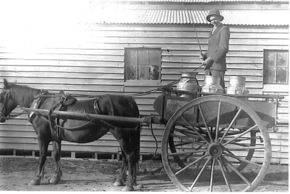
GORDON, James Edward
| Service Number: | 3017 |
|---|---|
| Enlisted: | 10 July 1916 |
| Last Rank: | Private |
| Last Unit: | 45th Infantry Battalion |
| Born: | Kangaroo Valley, New South Wales, Australia, 1897 |
| Home Town: | Kangaroo Valley, Shoalhaven Shire, New South Wales |
| Schooling: | Not yet discovered |
| Occupation: | Farm labourer |
| Died: | Killed in Action, Messines Belgium, 8 June 1917 |
| Cemetery: |
No known grave - "Known Unto God" Menin Gate Memorial , Menin Gate Memorial, Ypres, Flanders, Belgium |
| Memorials: | Australian War Memorial Roll of Honour, Ypres (Menin Gate) Memorial |
World War 1 Service
| 10 Jul 1916: | Enlisted AIF WW1, Private, 3017 | |
|---|---|---|
| 8 Nov 1916: | Involvement Private, 3017, 45th Infantry Battalion , --- :embarkation_roll: roll_number: '19' embarkation_place: Sydney embarkation_ship: SS Port Nicholson embarkation_ship_number: '' public_note: '' | |
| 8 Nov 1916: | Embarked Private, 3017, 45th Infantry Battalion , SS Port Nicholson, Sydney |
A Real Peacemaker
James (Jimmy) Edward Gordon had listened to all of the speeches at the various recruitment drives and the local soldier farewells before enlisting at Kiama at 19 years of age on 10 July 1916. The youngest son of William and Helena Gordon of Kangaroo Valley he was single and working as farm labourer, often running the milk each day to the Barrengarry Butter Factory.
As was the case with George Ditton, Peter McNellee and Jack Huxley who also enlisted around this time, he was assigned to the 45th Battalion as part of the 7th re-enforcement of that unit. The 45th was the "pup" of the 13th Battalion, a NSW unit that served with distinction at Gallipoli. As unpopular as it was, these first battalions were halved after the Evacuation to increase the strength of the AIF. Formed at Tel-el-Kebir in Egypt in March 1916 the 45th had the experience and reputation of the B and D Companies of the 13th at its core.
First trained at the Kiama Training Camp on the south coast of NSW Jimmy embarked on the SS Port Nicholson from Sydney on 8 November 1916, disembarking at Devonport England on 10 January 1917. Huxley, Ditton and McNellee had left Sydney a month earlier and were now being moved into the field in France. Ditton died at Flers a week later after only three days in the field.
Jimmy made landfall in Europe at Etaples on the western coast of France on 14 March 1917 as part of a massive reinforcement of 5 Officers and 459 other ranks into the 45th. They were being prepared for General Sir Douglas Haig's summer offensive and were reviewed with some ceremony by HRH the Prince of Wales on 22 March.
But the weather in Europe was still extremely cold after the worst recorded winter in 40 years. Gordon came down with influenza and bronchitis while at Bapaume in May.
His first major action was to follow in June with the commencement of the campaign known as the Third Battle of Ypres, a strategic town in northern Belgium. The campaign started on 7 June with the explosion of nineteen enormous mines that had been dug out to, and under the German lines over the past 18 months. Jimmy rose with the 45th that afternoon to leapfrog the first units and consolidate the earlier gains.
3017 Pte. James Edward Gordon was killed by the concussion of a shell burst on 8 June 1917 while in a support trench (Owl Support) at Messines Ridge. Jack Huxley was also killed by a sniper that day. It had been a harrowing 24 hours with their own artillery firing on them at some time causing a temporary retirement.
Jimmy Gordon died on his 20th birthday. Despite his AWM file clearly recording a (map referenced) burial site he has no known grave and his name appears on the Menin Gate Memorial at Ypres. 59 45th Battalion men that fell that day, including Huxley, share this anomaly. Made aware of this anomaly by amateur researchers the Australian Army Unrecovered War Casualties Unit (UWC) conducted an extensive archaeological dig at the map reference in March 2018. No bodies were found.
A large Valley congregation attended a memorial service for James Gordon, Jack Huxley and Bill Hay on 19 August. Captain-Chaplain Jamieson Williams referred to these men as "real peacemakers." His name appears on the War Memorial in the main street of Kangaroo Valley.
Submitted 8 January 2022 by Geoffrey Todd










